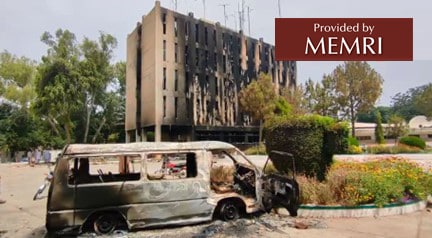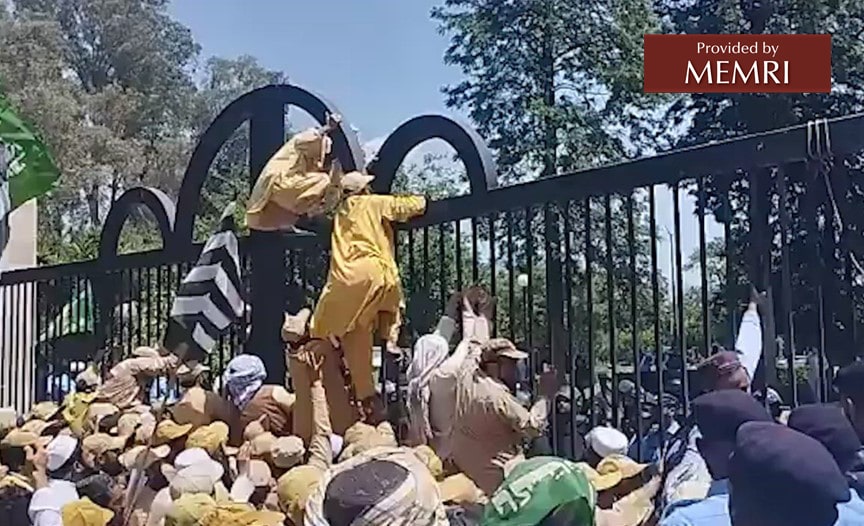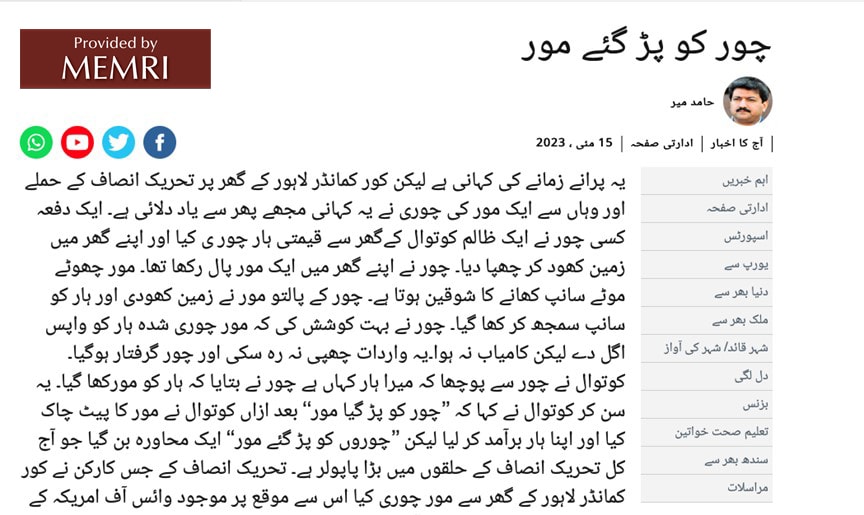In a column, Pakistan's former foreign secretary, the top bureaucrat below the foreign minister, has warned that the country might be heading toward civil war due to the failure of the political leaders to forge a consensus on holding elections. "The political leadership must agree on a compromise date for elections," Aizaz Ahmad Chaudhary wrote after the government defied a Supreme Court order to hold overdue provincial polls.
In recent weeks, Pakistan has seen rioting and mass protests, especially those triggered by the May 9 arrest of former Pakistani prime minister Imran, arguably the most popular Islamist politician in the country who has blamed the army and the government for delaying the polls by filing scores of corruption charges against him to thwart him politically. After his May 9 arrest, which was later declared illegal by the Supreme Court, the protesters shook the main gate of the Pakistani army's headquarters in Rawalpindi and attacked houses and properties of army commanders and ruling politicians.
In one case, a protester took a peacock from the home of the corps commander of Lahore, prompting senior journalist Hamid Mir, known for holding no-nonsense views, to write a column in the Urdu-language daily Roznama Jang in which he blamed all sections of the civilian leadership and the military establishment for the country's political turmoil. "It is not enough to recover the necklace from the stomach of the peacock, but the accountability of the thief [i.e., the military] who reared the peacock is also necessary," observed Hamid Mir, whose column is translated from Urdu can be read below after excerpts from Aizaz Ahmad Chaudhary's article.

A lone elderly woman shakes the main gate of Pakistan army's headquarters in Rawalpindi.
At the heart of Pakistan's turmoil is a deadlock in which, defying a Supreme Court order, the government wants to push provincial polls to October 2023 to buy time amid Imran Khan's immense current popularity. The governors, who are the federal government's nominees in the provinces, have refused to set the elections in process; the election commission argued that it does not have the necessary funds to hold the polls; the military refused to provide security in order to thwart the Supreme Court's order to hold the provincial polls, while Prime Minister Shehbaz Sharif has ensured that parliamentary approval needed for the election funds is denied.
These actions of the government and the military – which has lacked legitimacy in the eyes of people since the country's breakup and the creation of Bangladesh in 1971 – have caused a political instability, aided by economic turmoil and rising inflation, leading to Pakistan observers believing that the nuclear Islamic state of Pakistan could be headed to civil war. The situation has become serious as the Pakistani jihadi group Tehreek-e-Taliban Pakistan (TTP), learning from its parental organization's success in Afghanistan, has escalated its attacks in the Afghanistan-Pakistan border region, aiming to seize control.
Following are excerpts from the article by Aizaz Ahmad Chaudhary, the former bureaucrat and author of Diplomatic Footprints:[1]
"The Country Is In The Throes Of A Growing Civil Strife With Its Public Places Becoming A Venue For Regular Protests, Confrontation, And Rioting"
"Pakistan's polity is fractured. Politicians are not willing to unlock horns; the economy is slipping down a steep slope; and terrorist forces are resurging. Some analysts view this situation as essentially a political crisis which will resolve by itself. Others, less optimistic, find Pakistan in the midst of a 'polycrisis,' with political unrest, an economic downturn and security threats pushing Pakistan toward chaos.
"Then there are the realists, who are concerned that Pakistan's present civil strife might morph into a civil war. A recent editorial in this paper [Dawn of May 14, 2023] also rang the alarm bell: '...the nation seems to be flirting dangerously with civil war. It is tearing itself apart under the weight of its own contradictions.' Where exactly is Pakistan headed, and is there light at the end of the tunnel?
"The country is in the throes of a growing civil strife with its public places becoming a venue for regular protests, confrontation, and rioting. Social unrest is unleashing civil disorder, disobedience, and disruptive strikes. If this continues unchecked, the country could well descend into a catastrophic civil war.
"It would be folly to think that whatever has happened in Syria, Libya, Yemen, Afghanistan, Sudan or Rwanda cannot happen here. Each case is different, but the common thread is an acute culture of intolerance, nurtured over time, eventually breaking down the political and social fabric. The other feature common to these countries is the sustained political instability, with neither the ruling regime nor the opposition willing to accept a compromise. With no spirit of 'live and let live,' the resultant chaos has been exacerbated by external forces..."
"We Must Not Forget That Every Time Our Country Has Gone Through A Political And Constitutional Crisis, The Consequences Have Been Borne By The People"
"The political fallout has always been borne by the people. Take Sudan, whose 46 million people have suffered for decades from political instability and military interventions. Recently, the country witnessed a fratricidal power struggle between the military leadership of the regular army and a paramilitary force. As the situation spiralled toward chaos, hidden foreign hands exacerbated the civil war. The ultimate losers were the people of Sudan.
"The civil unrest in Syria, which started in March 2011, when the Assad regime ruthlessly suppressed protesters, quickly descended into civil war and an armed conflict that involved a complex web of domestic and foreign elements. Hundreds of thousands of Syrians were killed and millions displaced.

Imran Khan's supporters set fire to Radio Pakistan's headquarters in Peshawar (image: mmnews.tv)
SUPPORT OUR WORK

"Twelve years down the line, President Bashar al-Assad has regained control of much of Syria, but the once beautiful country has been destroyed. The most telling story is that of the Rwandan civil war, in which the Hutus and Tutsis failed to find peaceful coexistence. It ended in a genocide that left 800,000 people dead in 100 days in 1994.
"We must not forget that every time our country has gone through a political and constitutional crisis, the consequences have been borne by the people. In 1971, the political leaders of the time failed to respect the results of a democratic election while military ruler Yahya Khan engaged in a reckless military operation. The result was the inglorious, bloody separation of Pakistan's eastern wing [now Bangladesh]. Can our political and military leadership learn a lesson from that painful chapter of our 'history?'"
"The Political Leadership Must Agree On A Compromise Date For Elections; There Is No Shame In Reaching A Compromise Or Conceding Ground For The Larger Good"
"Can the leading lights of our political leadership muster enough courage and will to sit at the table and resolve their issues? If they don't, the situation might spin out of control the way it did in the aforementioned examples, with everyone losing and no one winning.
"The government led by Prime Minister Shehbaz Sharif wants the National Assembly to complete its five-year term, while former prime minister Imran Khan wants immediate elections. A compromise on a date for elections should not be this difficult, as May and October are only a few months apart.
"The political leadership should also agree on a new social compact and rules of conduct, giving significance to the following: the military establishment has announced its intent to remain apolitical, and it must not be dragged into politics; the decisions of the Supreme Court should be respected by all; the Election Commission must not be made controversial; and social media must not be used with impunity to malign every state institution.
"In this charged environment, the advice rendered by the Dawn editorial and echoed by many other independent analysts makes perfect sense: free and fair elections conducted to the satisfaction of all major parties. The political leadership must agree on a compromise date for elections. There is no shame in reaching a compromise or conceding ground for the larger good. A compromise may not please every party, but it certainly will elicit a sigh of relief from the people of Pakistan who are losing faith and confidence in this system of governance..."
Following are excerpts from Hamid Mir's column in Roznama Jang, as translated from Urdu:[2]
"In The Battle Between The Parliament And The Army, Often The Judiciary Sided With The Army And The Army Succeeded In Subduing The Parliament"
"This is an old story but the attack of [Imran Khan's political party the Pakistan] Tehreek-e-Insaf on the house of Corps Commander Lahore and the theft of a peacock from there has reminded me once again of this story. Once a thief stole a valuable necklace from the house of a cruel kotwal [military general, literally, a police chief] and hid it by digging the ground in his house.
"The thief kept the peacock in his house. Peacocks are fond of eating small snakes. The thief's pet peacock dug up the ground and mistook the necklace for a snake and ate it. The thief tried hard to get the peacock to return the stolen necklace but failed. This incident could not be hidden, and the thief was arrested.
"The kotwal asked the thief: 'Where is my necklace?' The thief told the kotwal that the peacock had eaten the necklace. After hearing this, the kotwal said, 'Theft at the thief's home!' Later Kotwal cut open the peacock's stomach and recovered his necklace, but 'Theft at the thief's home!' has become a proverb, that is very popular today in the circles of Tehreek-e-Insaf.
"The Tehreek-e-Insaf activist who stole the peacock from the house of the Corps Commander of Lahore was asked by a Voice of America reporter on the spot, why are you taking this peacock? The tiger of Tehreek-e-Insaf said in reply that this is the looted property of the people that we are taking back. An English-speaking aunty present at the scene proudly told reporters that she had stolen strawberries from the Corps Commander's kitchen refrigerator and is enjoying a great time with her friends.

Pro-government protesters led by Islamic religious leader Maulana Fazlur Rehman scale the main gate of Pakistan's Supreme Court in protest against its granting of bail to Imran Khan (image: Twitter.com)
"The Tehreek-e-Insaf people remember the proverb, but they do not know the background of this proverb at all. They are declaring a peacock as loot but forgetting that on May 9, 2023, they also played the role of a pet peacock that was reared by a thief. My reference is not to the thief [i.e., Imran Khan] who stole from the Tosha Khana [the government repository of gifts given by foreign leaders]. Many necklaces and watches were also stolen from Tosha Khana [by leaders of all the political parties] and many peacocks swallowed them as snakes.
"I am referring to those retired patriots [i.e., army generals] who sometimes tame lions for their political circus and when the lion [i.e., Imran Khan] revolts, then they tame peacocks. The honor of the institution of these retired patriots was no less than a precious necklace, but alas, their own reared peacock swallowed this honor. The events of May 9, which are the result of the 'Faiz' [blessing, a pun after the name of Lt.-Gen. Faiz Hameed, the then chief of the military's powerful Inter-Services Intelligence] of the patriots, will have to account for their national crimes, if not today, then tomorrow.
"The kotwal has to not only claw the peacock's belly to recover his stolen necklace, but also to punish the thieves who kept the peacocks for their crimes. The problem is that today the kotwal does not even trust the courts because some of the judges sitting in the courts make decisions not according to the law but on the request of their wives [who supposedly mediate on behalf of politicians].
"Has Imran Khan completely trampled the kotwal and the government sitting above him with the help of the qazi? Is there no obstacle in the way of Imran Khan becoming the ruler again? This fight is not as simple as it looks. This fight is becoming a threat to the security and survival of Pakistan. It is very important to understand the causes of this fight and eliminate those causes.

Hamid Mir's article in Roznama Jang.
"To eliminate these reasons, we have to admit to some bitter facts, but unfortunately in today's Pakistan, from Imran Khan, Nawaz Sharif, Shahbaz Sharif, Asif Ali Zardari, Bilawal Bhutto Zardari, and Maulana Fazlur Rehman to [chief justice of the Supreme Court of Pakistan] Justice Umar Atta Bandial, no one is ready to listen and tell the truth.
"The events of May 9 are actually a continuation of the continuous interference of the army and the ISI in our politics. In the battle between the parliament and the army, often the judiciary sided with the army and the army succeeded in subduing the parliament.
"In the Lawyers' Movement of 2007, the political parties supported the judiciary, and the judiciary strongly resisted the army. After the restoration of the suspended chief justice [Iftikhar Muhammad Chaudhry] and judges by [the then military ruler] General Pervez Musharraf, the judiciary also became a stakeholder in the politics of Pakistan. The judiciary once again started interfering with the powers of the parliament by colluding with the secret agencies."
"It Is A Pity That [Imran Khan's] Tehreek-E-Insaf, [Prime Minister Shehbaz Sharif's] Muslim League, And [Bilawal Bhutto's] Pakistan People's Party Became The Facilitators Of The Enemies Of Parliamentary Democracy By Giving An Extension To General Bajwa"
"The cases of disqualification of elected prime ministers in political cases were not related to the rule of law but to the political agenda of some judges. This agenda came to the fore when former Chief Justice Iftikhar Muhammad Chaudhary raised the slogan of 'bring back the presidential system' in Pakistan by forming a political party. This slogan was not that of Iftikhar Mohammad Chaudhary.
"This is the long-standing wish that former ISI [Inter-Services Intelligence] chief General Ahmad Shuja Pasha himself once expressed to me. He wanted to get my help for the implementation of a presidential system in Pakistan, but he was annoyed by my rude refusal, and I suffered the serious consequences of this refusal time and again.
"The main purpose of bringing Imran Khan to power [by the ISI] through bullying and rigging the 2018 election was to push Pakistan toward a presidential system and that is why General Qamar Javed Bajwa [army chief until 2022] repeatedly called the 18th Amendment to the Constitution [which grants more powers to the ministerial cabinet than to the president] more dangerous than Sheikh Mujibur Rahman's Six Points [a movement that ultimately led to the breakup of Pakistan and the creation of Bangladesh, formerly East Pakistan, in 1971].
"It is a pity that [Imran Khan's] Tehreek-e-Insaf, [Prime Minister Shehbaz Sharif's] Muslim League, and [Bilawal Bhutto's] Pakistan People's Party became the facilitators of the enemies of parliamentary democracy by giving an extension to General Bajwa.

Imran Khan (left) has accused Pakistan Army chief General Asim Munir of thwarting him.
"It did not end there, but even after Shehbaz Sharif became the Prime Minister in 2022, the Muslim League again became Bajwa's facilitator to bring the junior judges of the High Courts to the Supreme Court on the orders of General Bajwa. If the Muslim League had not facilitated General Bajwa, the situation would have been different today. Today, Muslim League has become the spokesperson of the Pakistan Army Chief and Tehreek-e-Insaf that of the Chief Justice.
"After seeking relief from the Supreme Court and the Islamabad High Court, Imran Khan has turned the political battle into a battle of institutions by making a statement against Army Chief General Asim Munir. After the attack on the house of the Corps Commander of Lahore, the ruling alliance announced a sit-in outside the Supreme Court.
"Both the sanctity of institutions and human rights are being violated in the fight of political parties. I see a constructive aspect in this and destruction as well. The majority of the people have understood that the reason for most of our problems is the interference of the army and the judiciary in politics and today our major political parties are protecting their interests by using the shoulders of these two institutions. These organizations should stop interfering in politics. It is not enough to recover the necklace from the stomach of the peacock, but the accountability of the thief who reared the peacock is also necessary."




